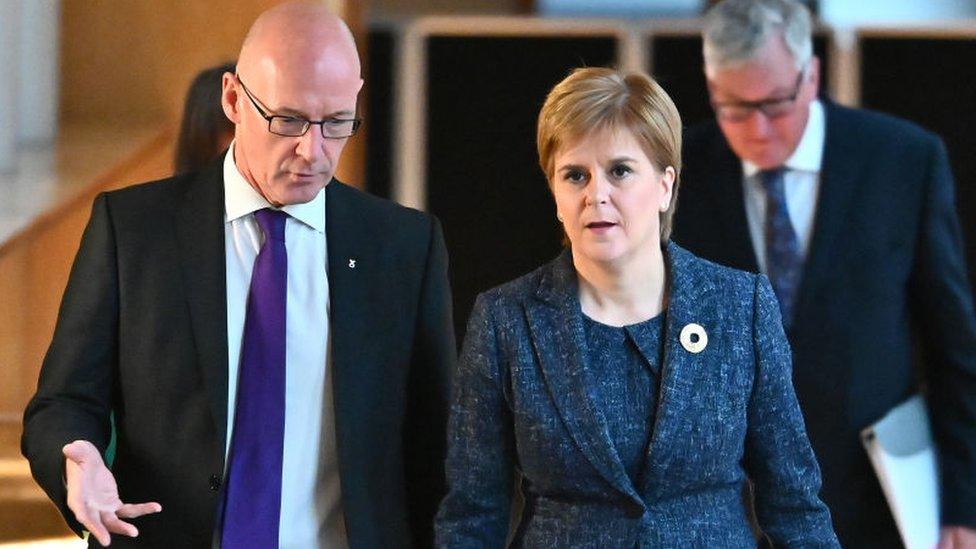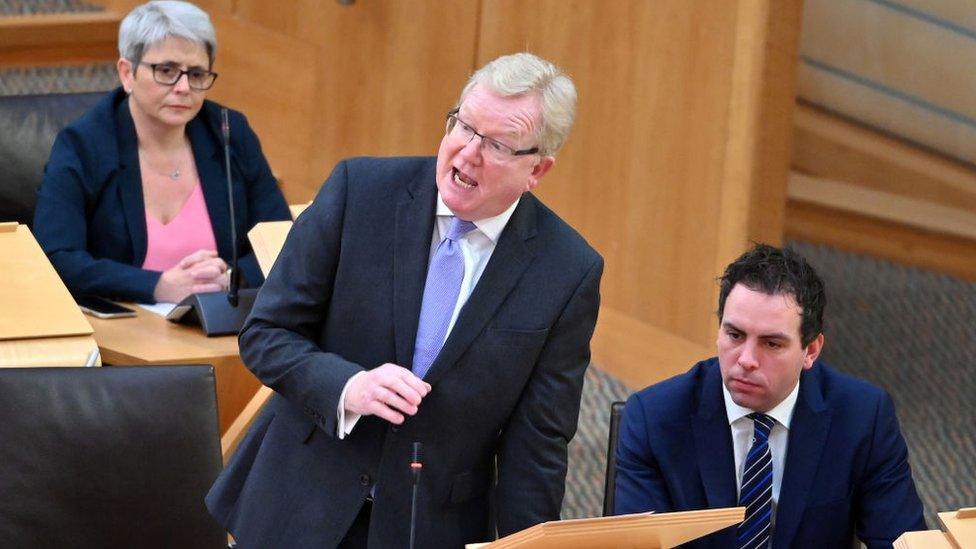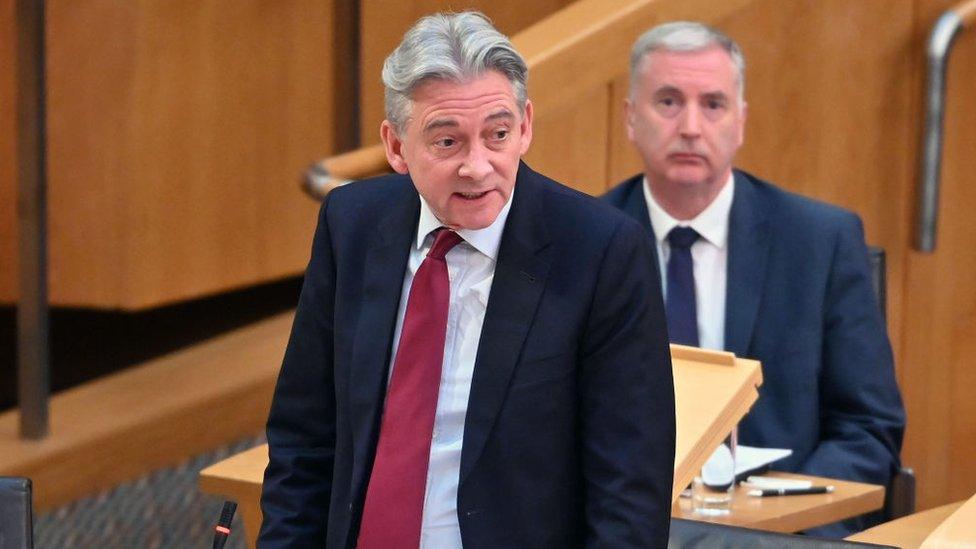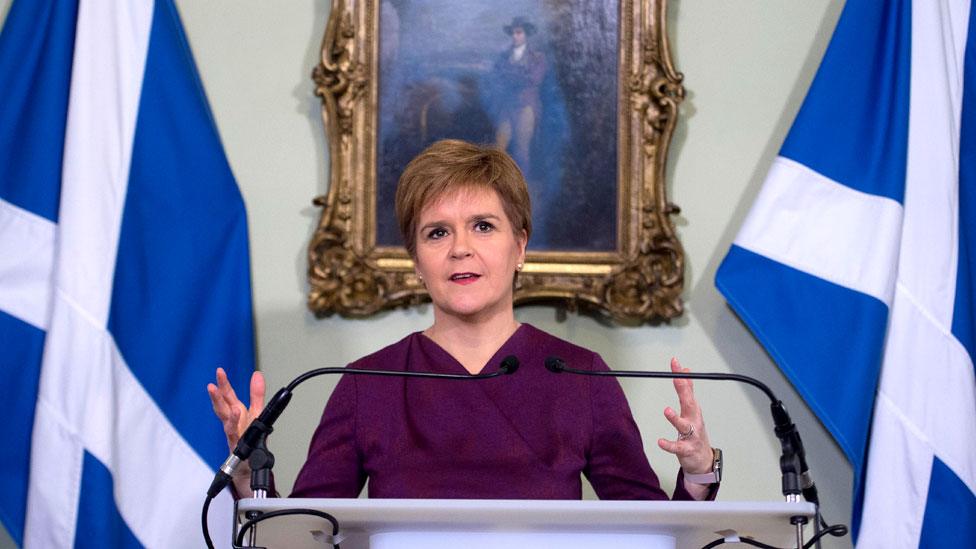Who passed the test in education debate?
- Published

John Swinney and Nicola Sturgeon put on a united front during FMQs in response to questions about educational standards
Question One: What percentage of a) support and b) derision does the Curriculum for Excellence attract? Do not attempt to write on both sides of the page at once.
In framing my answer to this exam question, I might be tempted to note, in passing, the academic who once said that the CfE wasn't a curriculum and it wasn't about excellence; the only word which was accurate was "for".
But that would simply be my customary sense of iconoclastic mischief. And Jackson Carlaw, the would-be Tory leader, conceded that there was much about Scottish education which merited support, which matched category A in my cod test.
He was, however, inclined also to pursue issues relating to category B, perceived failings.
Mr Carlaw, questioning the first minister, was speaking in context. On Wednesday night, MSPs voted to demand a wide-ranging review into Scottish education.
John Swinney, the education secretary, was asked about this vote on the wireless this morning by my estimable colleague, Gary Robertson.
Mr Swinney responded with care and caution, as is his wont. There had been a full external review in 2015. Changes from that were still being implemented.
Further, he had already instigated a review into the senior phase of school pedagogy. It was important to avoid cutting across that.
No audible caveats
In sum, he would "consider how to respond constructively" to the Parliamentary vote. Gary repeatedly suggested that a constructive response would be to agree to Holyrood's demand. Mr Swinney declined to give that easy answer, while strenuously denying that he would ignore the vote.
Just four hours later, there was Nicola Sturgeon, facing questions on the same topic from Mr Carlaw. No audible caveats here. The Scottish government would "abide by the will of Parliament".
At her side, Mr Swinney nodded sagely as she advised MSPs that the education secretary would, in due course, set out details as to how, exactly, that will would be heeded.

Jackson Carlaw stuck to his guns in grilling Ms Sturgeon on government education policy
Now, it is perfectly possible to construct a form of words which bridges the two positions. No doubt, it will form the lengthy prologue to the eventual SG document announcing details of the review.
Both ministers were offering a governmental response to a Parliamentary vote. But the tone was rather different. The nuance evident in Mr Swinney's response was absent from Ms Sturgeon's comments.
Why? Firstly, it may be that ministers have collectively concluded that it will be relatively simple to expand the review - and thus pre-empt further complaints from Mr Carlaw, who is plainly attempting to set a new record for the most consecutive questions in Parliament on one topic.

Secondly, both Ms Sturgeon and Mr Swinney may be motivated by the thought that perhaps a further prod to the educational system would be helpful, while coating it with support for the areas of success, listed statistically by the first minister.
And there is, of course, a third consideration. Ms Sturgeon hinted at it in her responses to Mr Carlaw.
She hoped, en passant, that the Tory leader would be similarly enthusiastic about adhering to the will of Holyrood on other issues, in the future.
The FM did not specify what she had in mind. There was no need. It was evident that she was referring to the further Holyrood vote on the demand for an independence referendum, which she has already signalled will take place soon.
You can see the potential dilemma, can't you? If ministers ignore - or can be represented as ignoring - a Parliamentary vote on education, avowedly the top SG priority, then their demand for Holyrood's will to be met re indyref2 risks being weakened just a tad.
Debating mandates
Labour's Richard Leonard pursued issues relating to the Scottish justice system. He cited diverse, tragic individual examples, thus applying pressure to the FM. But his overall approach was effective, as was the first minister's response.
To be quite clear, she was not remotely discomfited by either the Tory or Labour questions. But she was palpably on happier ground with the question from Alison Johnstone of the Greens.
Ms Johnstone excoriated Brexit and the subsequent UK government thwarting of indyref2. The first minister vigorously and volubly agreed.
Once again, we were debating mandates. Ms Sturgeon said she was prepared to concede that Boris Johnson had a mandate to remain in Downing Street. But she argued that comparable concessions should be made with regard to the SNP's success in Scotland in December.
A little later, up popped Mike Rumbles of the Liberal Democrats. In terms of voting share, he said, 55% of voters in Scotland in December had declined to support the SNP. Whaur's yer mandate noo, as he didn't say.

Labour's Richard Leonard wanted answers on the Scottish justice system
To be precise, those who didn't vote SNP include 1% who opted for the Greens, another party supporting independence.
However, Mr Rumbles' wider point, once it emerged from the cacophony of guffaws aimed in his general direction, was that Ms Sturgeon could not claim a mandate for indyref2 from December's outcome, at least in terms of popular voting share.
To which Ms Sturgeon had a ready response. The SNP had stood for election, repeatedly, on a platform which manifestly featured independence. They had been successful, as measured by seats - the test which has given Boris Johnson his 80-seat majority, the test which will result in Brexit at the end of this month.
Further, the Scottish Tories had explicitly sought support for a platform which majored on thwarting indyref2. They had lost ground and more than half their seats. QED, as she equally didn't say.
And finally, a word anent symbolism. At Holyrood, it's just been announced that the EU flag outside Parliament will be lowered and stowed away on the 31st of January, Brexit day.
There was no mention of bongs.
- Published14 January 2020

